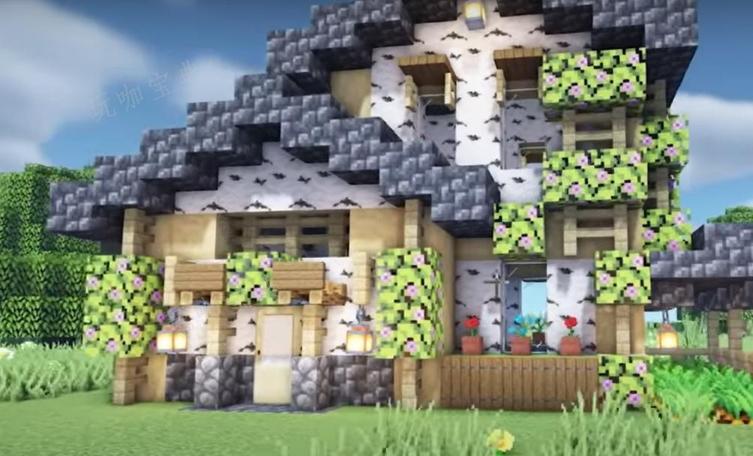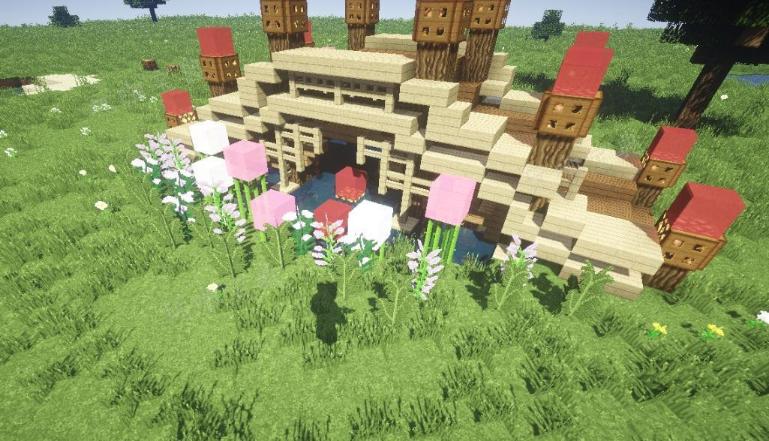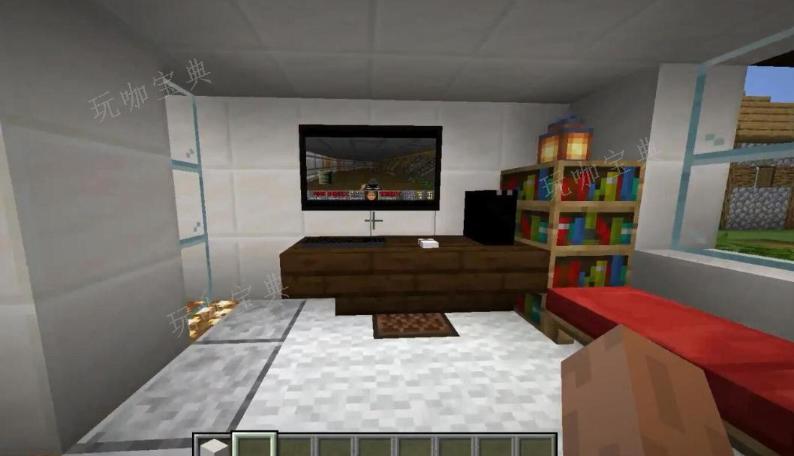How to transfer a homeowner in "Minecraft"?
php editor Xigua explains in detail how to transfer homeowners in "Minecraft". In the game, homeowners can choose to transfer their rights to other players and make them new homeowners. This process involves some steps and operations, and players need to follow the instructions to successfully complete the transfer. Next, we will explain how to transfer the owner in Minecraft one by one, so that you can easily master this skill.
In "Minecraft", many players will set up their own servers or multiplayer rooms to share this boundless world with their friends. But then there is the possibility that managers or “homeowners” need to transfer their location to someone else for a variety of reasons. How to conduct a homeowner transfer correctly and efficiently? Below is a thorough guide.

We need to understand the basic operation of multiplayer game rooms or servers in "Minecraft". Unlike single-player games, multiplayer interaction involves the mechanism of network communication and data saving, which means that the transfer of the homeowner is not A simple "name change" operation involves an important process of power and data management.
Confirm the identity of the successor: Make sure that you and the player who is planning to take over have reached an agreement, and both parties have completed the transfer process online.
Backup world data: It is highly recommended to back up the current world before transferring the owner. The purpose of this is to prevent data loss due to unexpected circumstances.
Understand the transfer steps: Understanding the detailed transfer steps and possible precautions in advance can help you complete the entire process more smoothly.
Start the game: The original homeowner needs to start "Minecraft" on his mobile phone and enter the previously created multiplayer game world.

Enter the game settings: In the game interface, click the pause button, and then select the "Setting" option.
Manage players: In the settings menu, find "Manage Players" or a similarly named option. This section displays a list of all players who have joined the world.
Change permissions: In the selected player menu, change the permissions to "Owner" or "Admin", depending on the specific game version.
Confirm transfer: After completing the permission changes, return to the main game interface and notify the successor player to confirm whether the corresponding permissions have been obtained.
Keep communication open: When performing a transfer operation, make sure to maintain open communication with the succeeding player so that problems encountered during the operation can be solved in a timely manner.
Prevent data loss: Again, be sure to back up your world data before transferring to avoid accidents during the transfer process.

Rights and Responsibilities: Please clearly inform the successor that the host not only has higher game management authority, but also assumes the responsibility of managing and maintaining the game environment.
Permission changes do not take effect: If the player who takes over after the operation does not obtain the expected permissions, it is recommended to re-enter the game and repeat the above steps, or check whether the game version supports this operation.
Data loss: If you fail to back up world data in advance and encounter data loss, you can try to contact the game’s official customer service for help, but recovery possibilities are limited.
Operation error: If there is a problem caused by an operation error, exit the game immediately and restore data from backup.
The homeowner transfer process in the mobile version of "Minecraft" is actually very simple. As long as you follow the above steps step by step, you will basically not encounter any big problems. As an operation involving the transfer of power, it must be taken seriously. Maintain good interaction and respect with the game community so that every player who enters your world can have an enjoyable and safe gaming experience. Have fun with Minecraft and unleash your creativity!
The above is the detailed content of How to transfer a homeowner in "Minecraft"?. For more information, please follow other related articles on the PHP Chinese website!

Hot AI Tools

Undresser.AI Undress
AI-powered app for creating realistic nude photos

AI Clothes Remover
Online AI tool for removing clothes from photos.

Undress AI Tool
Undress images for free

Clothoff.io
AI clothes remover

Video Face Swap
Swap faces in any video effortlessly with our completely free AI face swap tool!

Hot Article

Hot Tools

Notepad++7.3.1
Easy-to-use and free code editor

SublimeText3 Chinese version
Chinese version, very easy to use

Zend Studio 13.0.1
Powerful PHP integrated development environment

Dreamweaver CS6
Visual web development tools

SublimeText3 Mac version
God-level code editing software (SublimeText3)

Hot Topics
 1663
1663
 14
14
 1419
1419
 52
52
 1313
1313
 25
25
 1263
1263
 29
29
 1236
1236
 24
24
 Summary of phpmyadmin vulnerabilities
Apr 10, 2025 pm 10:24 PM
Summary of phpmyadmin vulnerabilities
Apr 10, 2025 pm 10:24 PM
The key to PHPMyAdmin security defense strategy is: 1. Use the latest version of PHPMyAdmin and regularly update PHP and MySQL; 2. Strictly control access rights, use .htaccess or web server access control; 3. Enable strong password and two-factor authentication; 4. Back up the database regularly; 5. Carefully check the configuration files to avoid exposing sensitive information; 6. Use Web Application Firewall (WAF); 7. Carry out security audits. These measures can effectively reduce the security risks caused by PHPMyAdmin due to improper configuration, over-old version or environmental security risks, and ensure the security of the database.
 How to update the image of docker
Apr 15, 2025 pm 12:03 PM
How to update the image of docker
Apr 15, 2025 pm 12:03 PM
The steps to update a Docker image are as follows: Pull the latest image tag New image Delete the old image for a specific tag (optional) Restart the container (if needed)
 What are the oracle11g database migration tools?
Apr 11, 2025 pm 03:36 PM
What are the oracle11g database migration tools?
Apr 11, 2025 pm 03:36 PM
How to choose Oracle 11g migration tool? Determine the migration target and determine the tool requirements. Mainstream tool classification: Oracle's own tools (expdp/impdp) third-party tools (GoldenGate, DataStage) cloud platform services (such as AWS, Azure) to select tools that are suitable for project size and complexity. FAQs and Debugging: Network Problems Permissions Data Consistency Issues Insufficient Space Optimization and Best Practices: Parallel Processing Data Compression Incremental Migration Test
 What are the common misunderstandings in CentOS HDFS configuration?
Apr 14, 2025 pm 07:12 PM
What are the common misunderstandings in CentOS HDFS configuration?
Apr 14, 2025 pm 07:12 PM
Common problems and solutions for Hadoop Distributed File System (HDFS) configuration under CentOS When building a HadoopHDFS cluster on CentOS, some common misconfigurations may lead to performance degradation, data loss and even the cluster cannot start. This article summarizes these common problems and their solutions to help you avoid these pitfalls and ensure the stability and efficient operation of your HDFS cluster. Rack-aware configuration error: Problem: Rack-aware information is not configured correctly, resulting in uneven distribution of data block replicas and increasing network load. Solution: Double check the rack-aware configuration in the hdfs-site.xml file and use hdfsdfsadmin-printTopo
 What is the impact of Redis persistence on memory?
Apr 10, 2025 pm 02:15 PM
What is the impact of Redis persistence on memory?
Apr 10, 2025 pm 02:15 PM
Redis persistence will take up extra memory, RDB temporarily increases memory usage when generating snapshots, and AOF continues to take up memory when appending logs. Influencing factors include data volume, persistence policy and Redis configuration. To mitigate the impact, you can reasonably configure RDB snapshot policies, optimize AOF configuration, upgrade hardware and monitor memory usage. Furthermore, it is crucial to find a balance between performance and data security.
 What to do if the oracle log is full
Apr 12, 2025 am 06:09 AM
What to do if the oracle log is full
Apr 12, 2025 am 06:09 AM
When Oracle log files are full, the following solutions can be adopted: 1) Clean old log files; 2) Increase the log file size; 3) Increase the log file group; 4) Set up automatic log management; 5) Reinitialize the database. Before implementing any solution, it is recommended to back up the database to prevent data loss.
 How to solve the oracle lock table
Apr 11, 2025 pm 07:45 PM
How to solve the oracle lock table
Apr 11, 2025 pm 07:45 PM
Oracle lock tables can be solved by viewing lock information and finding locked objects and sessions. Use the KILL command to terminate the idle locked session. Restart the database instance and release all locks. Use the ALTER SYSTEM KILL SESSION command to terminate a stubborn locked session. Use the DBMS_LOCK package for programmatic lock management. Optimize query to reduce lock frequency. Set lock compatibility level to reduce lock contention. Use concurrency control mechanisms to reduce locking requirements. Enable automatic deadlock detection, and the system will automatically roll back the deadlock session.
 How to create oracle database How to create oracle database
Apr 11, 2025 pm 02:36 PM
How to create oracle database How to create oracle database
Apr 11, 2025 pm 02:36 PM
To create an Oracle database, the common method is to use the dbca graphical tool. The steps are as follows: 1. Use the dbca tool to set the dbName to specify the database name; 2. Set sysPassword and systemPassword to strong passwords; 3. Set characterSet and nationalCharacterSet to AL32UTF8; 4. Set memorySize and tablespaceSize to adjust according to actual needs; 5. Specify the logFile path. Advanced methods are created manually using SQL commands, but are more complex and prone to errors. Pay attention to password strength, character set selection, tablespace size and memory




